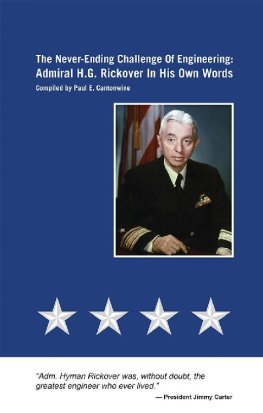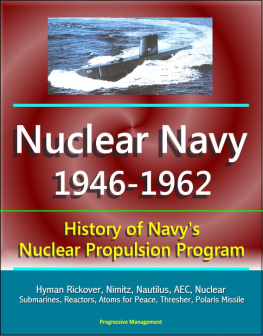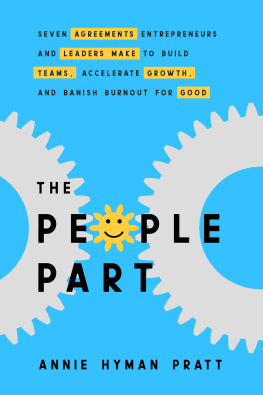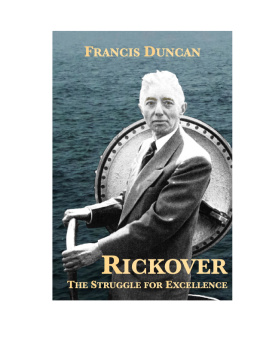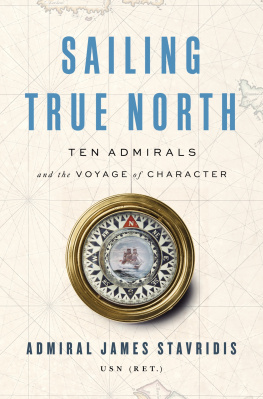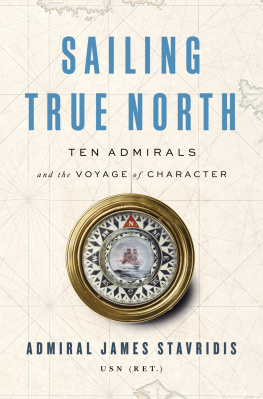Hyman G. Rickover - The Never-Ending Challenge of Engineering: Admiral H.G. Rickover in His Own Words
Here you can read online Hyman G. Rickover - The Never-Ending Challenge of Engineering: Admiral H.G. Rickover in His Own Words full text of the book (entire story) in english for free. Download pdf and epub, get meaning, cover and reviews about this ebook. year: 2015, publisher: American Nuclear Society, genre: Religion. Description of the work, (preface) as well as reviews are available. Best literature library LitArk.com created for fans of good reading and offers a wide selection of genres:
Romance novel
Science fiction
Adventure
Detective
Science
History
Home and family
Prose
Art
Politics
Computer
Non-fiction
Religion
Business
Children
Humor
Choose a favorite category and find really read worthwhile books. Enjoy immersion in the world of imagination, feel the emotions of the characters or learn something new for yourself, make an fascinating discovery.
- Book:The Never-Ending Challenge of Engineering: Admiral H.G. Rickover in His Own Words
- Author:
- Publisher:American Nuclear Society
- Genre:
- Year:2015
- Rating:3 / 5
- Favourites:Add to favourites
- Your mark:
- 60
- 1
- 2
- 3
- 4
- 5
The Never-Ending Challenge of Engineering: Admiral H.G. Rickover in His Own Words: summary, description and annotation
We offer to read an annotation, description, summary or preface (depends on what the author of the book "The Never-Ending Challenge of Engineering: Admiral H.G. Rickover in His Own Words" wrote himself). If you haven't found the necessary information about the book — write in the comments, we will try to find it.
Hyman G. Rickover: author's other books
Who wrote The Never-Ending Challenge of Engineering: Admiral H.G. Rickover in His Own Words? Find out the surname, the name of the author of the book and a list of all author's works by series.
The Never-Ending Challenge of Engineering: Admiral H.G. Rickover in His Own Words — read online for free the complete book (whole text) full work
Below is the text of the book, divided by pages. System saving the place of the last page read, allows you to conveniently read the book "The Never-Ending Challenge of Engineering: Admiral H.G. Rickover in His Own Words" online for free, without having to search again every time where you left off. Put a bookmark, and you can go to the page where you finished reading at any time.
Font size:
Interval:
Bookmark:
THE NEVER-ENDING CHALLENGE OF ENGINEERING
Admiral H. G. Rickover in His Own Words
Compiled by Paul E. Cantonwine La Grange Park, Illinois USA
Library of Congress Cataloging-in-Publication Data Rickover, Hyman George.
[Works. Selections. 2013] The never-ending challenge of engineering : Admiral H.G. Rickover in his own words / compiled by Paul E. Cantonwine.
pages cm Includes bibliographical references and index.
ISBN 978-0-89448-57 - ( ebook ) 1. Engineering. 2. Leadership. 3. Military engineering--United States. 4.
Nuclear engineering--United States. 5. United States. Navy--Research-History--20th century. 6. Rickover, Hyman George. I.
Cantonwine, Paul E. II. Title.
TA155.R53 2013 620.0092--dc23
2013035089
ISBN: 978-0-89448-579-4 Library of Congress Catalogue Card Number: 2013035089 ANS Order Number: 690090 2013 American Nuclear Society 555 North Kensington Avenue La Grange Park, Illinois 60526 USA All rights reserved. No part of this book may be reproduced in any form without the written permission of the publisher.
For My Parents
and
In Memory of Theodore Rockwell
PREFACE
This book is a practical and philosophical look at the principles used by engineers from the perspective of one of Americas greatest engineers, Admiral Hyman George Rickover. Admiral Rickover is an icon in the history of nuclear power, and the list of his accomplishments is long. From the USS Nautilus and its land-based prototype (the first nuclear-powered submarine and large-scale application of nuclear power), to the USS Seawolf (the first submarine powered by a liquid metal, sodium-cooled reactor), to the Shippingport Atomic Power Station in western Pennsylvania (the first fully commercial demonstration of nuclear power), to the light water breeder reactor (the first demonstration of nuclear fuel breeding in a light water reactor), Rickover built the foundation for a safe nuclear power industry and, thus, deserves to be called the Father of Nuclear Power. Admiral Rickover understood well the history of technology and one of his greatest contributions was to develop nuclear power technology to meet much higher safety and quality standards than past technological developments. Still today, no radiological deaths have been caused by nuclear power technology in Rickovers nuclear Navy or within the U.S.
commercial nuclear industry (including Three Mile Island and Fukushima, which used U.S. reactor technology) and only three such deaths at an experimental reactor designed for the Army. This record of safety is unique in the history of power technology, and thus the thoughts of the man most responsible for how nuclear power technology was developed in the United States should be of interest to everyone working in a technical field especially ones where customer/public safety and quality are paramount.
I was introduced to Admiral Rickover in 1999 (13 years after his death) when I joined the Bettis Atomic Power Laboratory to work in the Naval Nuclear Propulsion Program (NNPP), which he had started in 1948 and led until 1982. I had just finished my Ph.D. in materials science and engineering at the University of Virginia. Academically, I was well prepared to contribute.
However, I learned very early on that although I was knowledgeable about my field, I had much to learn about applying it within an organization that had to make real engineering decisions. In retrospect, I might describe the feelings I had transitioning from a researcher in the academic world to an engineer in the Naval Nuclear Propulsion Program as a culture shock.
Implicitly we understand that an organizations culture is defined by its leader. That is, an important part of leadership is shaping culture. And the culture of the NNPP was, and I am sure still is, largely shaped by its first leader, Admiral H. G. Rickover. When Rickover was still leading the program, he was often approached by others to describe how he managed such a successful program. Usually he felt others were looking for a recipe for success, a sort of leadership-by-numbers approach. He invariably disappointed them when he said that he had no recipe to give them. Instead, when he talked about the success of his program he talked about cultural factors, such as personal responsibility, valuing education and training, fostering a questioning attitude, facing the facts, driving quality, and designing with conservatism for safety. In the NNPP, every new engineer is indoctrinated with a concern for the safety of the sailors who eat, sleep, and work in close quarters with a nuclear reactor. Rickover would often make this point when discussing conservatism by asking those involved in the technical discussion, What would you do if your son was a sailor on this ship? When I left the Naval Nuclear Propulsion Program in 2006 for a commercial nuclear fuel vendor, I had a very different experience compared to my first transition. Instead of culture shock, I immediately felt at home. I now attribute this experience to Admiral Rickovers influence on the culture in the commercial nuclear industry. In my organization, our leaders shape our culture by continually reinforcing that Integrity, Safety, and Quality must always come before Output (ISQO). We refer to it as an ISQO culture. For the industry, the Institute of Nuclear Power Operations and the Nuclear Regulatory Commission also reinforce these cultural values in their policy statements on safety culturewhere most of the safety-culture traits are right out of Rickovers engineering philosophy.
The idea of compiling Rickovers writings into a book came to me during a lunch meeting with Ted Rockwell, author of The Rickover Effect, who worked intimately with Admiral Rickover during the first 15 years of the Naval Reactors program (19491964). I had recently read a number of Rickovers books and many of his speeches, and I found in Rickovers writings an intellectual engineer who had no fear about speaking his mind on any topicespecially when he felt it needed a bit of criticism. Besides engineering and technology, he wrote and spoke about education, democracy, government and history, business, law, and the Navy. The American education establishment was the target of most of Rickovers criticism; improving education was the topic of three of his books and countless speeches. But as an engineer in the nuclear power industry, I was mostly taken by his writings on engineering and technology. In some cases this was also criticism, as in his 1962 speech to the National Metals Congress, which inspired the title for this book (see Chapter 7), or his 1974 speech on engineering in the Navy (see Chapter 9). But in most cases, I would characterize the purpose of his writings on engineering as a desire to pass on advice. He gave advice to young people entering a technology field, to practicing engineers, to leaders responsible for managing technology, and to nontechnical people on how the country should best develop technology that affects the public.
The chapters of this book were written by Admiral Rickover largely as speeches that he gave over a 30-year period from 1953 to 1982. Although his thoughts are as much as 60 years old, they are still relevant today (though, hopefully, his use of man in the universal will not be distracting to female readers). The book is divided into five different parts, with each part addressing various never-ending challenges of engineering. The challenge of continually developing the mind is addressed in Becoming an Innovator, and examples of how this might be done are provided in the biographical sketches of Benjamin Franklin, Thomas Edison, and George Washington Carver in Three American Innovators. In Engineering in Practice, Rickover considers the never-ending challenge of creating an organizational culture where engineers can work as professionals, where they are technically competent and held responsible for their work, where they can demand highquality standards, and where they face facts and design with conservatism.
Font size:
Interval:
Bookmark:
Similar books «The Never-Ending Challenge of Engineering: Admiral H.G. Rickover in His Own Words»
Look at similar books to The Never-Ending Challenge of Engineering: Admiral H.G. Rickover in His Own Words. We have selected literature similar in name and meaning in the hope of providing readers with more options to find new, interesting, not yet read works.
Discussion, reviews of the book The Never-Ending Challenge of Engineering: Admiral H.G. Rickover in His Own Words and just readers' own opinions. Leave your comments, write what you think about the work, its meaning or the main characters. Specify what exactly you liked and what you didn't like, and why you think so.

